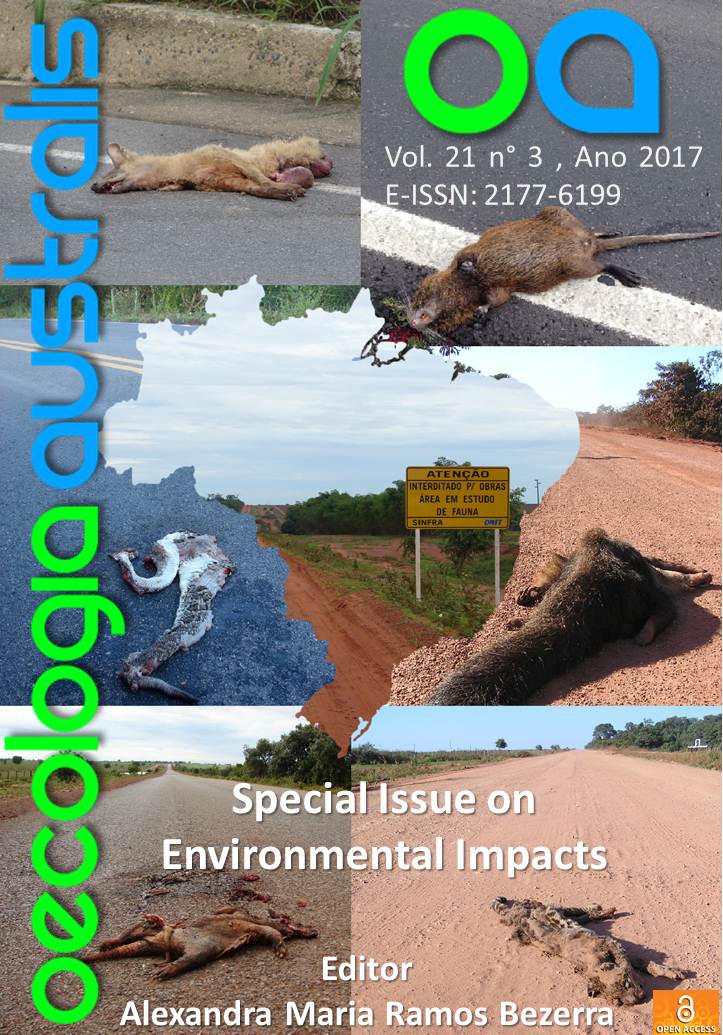CARACTERIZAÇÃO DE PROGRAMAS DE EDUCAÇÃO AMBIENTAL NO LICENCIAMENTO: CONTRIBUIÇÕES PARA REFLEXÃO E PERSPECTIVAS FUTURAS
DOI:
https://doi.org/10.4257/oeco.2017.2103.07Keywords:
environmental studies, environmental permitting, IBAMA, IN 02/2012, basic environmental planAbstract
Programas de educação ambiental associados ao processo de licenciamento ambiental são uma importante estratégia para efetivação dos direitos de diferentes atores sociais, incentivando a participação na gestão e nas decisões que afetam a qualidade ambiental. Programas de educação ambiental normalmente estão entre as ações de mitigação e compensação dos impactos dos Planos Básicos Ambientais de empreendimentos (PBAs) e devem seguir as diretrizes da Instrução Normativa (IN) IBAMA 02/2012. Caracterizamos a forma de avaliação proposta em 24 programas de educação ambiental de empreendimentos submetidos ao processo de licenciamento, avaliando a forma de avaliação e os indicadores apresentados em cada programa analisado. Apenas 4% dos programas não apresentaram indicadores, sendo que a maior parte dos programas apresentou indicadores quantitativos (88%), embora dentre estes indicadores apenas 75% estivessem claramente descritos. Indicadores qualitativos foram observados em 70% dos programas, sendo que apenas 39% destes estavam descritos de forma clara. Ao analisar se os indicadores em geral estavam condizentes com as metas descritas no programa, observou-se que 50% estavam condizentes, 23% estavam parcialmente condizentes e 27% não estavam condizentes. Por fim, embora todos os programas tenham apresentado uma seção de metodologia das ações a serem realizadas, 25,09% não descreviam nenhum método de avaliação de seus resultados. A IN IBAMA 02/2012 apresenta os fundamentos norteadores e reguladores para elaboração e execução de programas de educação ambiental no âmbito do licenciamento. Entretanto, neste artigo demonstramos como programas de educação ambiental de PBAs de empreendimentos não cumprem parte dos requisitos mínimos exigidos. Entendemos que a IN 02/2012 deve ser revisada para incluir explicitamente o que deve ser entendido por objetivos, metas e indicadores, a fim de exigir programas estruturados em que os indicadores e a avaliação estejam diretamente associados aos objetivos propostos.
ABSTRACT - DESCRIPTION OF THE ENVIRONMENAL EDUCATION PROGRAMS FROM ENVIRONMENTAL LICENSING: CONSIDERATIONS AND FUTURE PERSPECTIVES
Environmental education programs associated with the licensing process are an important strategy for the implementation of different social actors' rights, encouraging participation in management and in decision making that affect environmental quality. Environmental education programs are usually included among programs for mitigation and compensation of impacts of activities in Brazil, and should follow the guidelines posed by IBAMA Normative Instruction 02/2012. We characterize 24 environmental education programs of projects submitted to the licensing process focusing on their proposed evaluation indicators. Only 4% of the programs did not show indicators, and most programs presented quantitative indicators (88%), but among these indicators only 75% were clearly described. Qualitative indicators were observed in 70% of the programs, with only 39% of these clearly described. In considering whether the indicators were generally consistent with the goals outlined in the program, it was noted that 50% were consistent, 23% were partially consistent and 27% were inconsistent. Finally, although all programs have presented a methods section describing actions, 25.09% did not describe any method for evaluating its results. The IN IBAMA 02/2012 presents the guidelines for planning and implementing of environmental education programs under the environmental licensing process. However, in this article we demonstrate how environmental education programs in this context do not meet part of the minimum requirements. We believe that the IN 02/2012 should be revised to explicitly state what should be understood as goals, targets and indicators in order to require structured programs in which the indicators of evaluation are directly associated with the proposed objectives.


